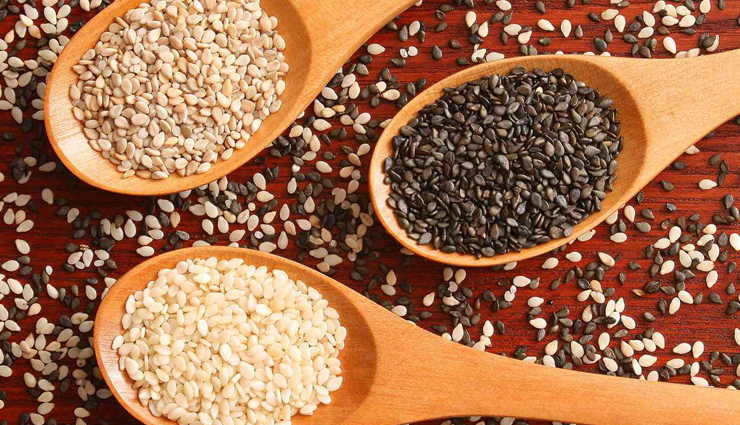- Home›
- Healthy Living›
- Discovering The Tiny Powerhouse: 9 Health Benefits Of Sesame Seeds
Discovering The Tiny Powerhouse: 9 Health Benefits Of Sesame Seeds
By: Priyanka Maheshwari Mon, 08 May 2023 10:48:51

Sesame seeds are small, flat seeds that come from the Sesamum indicum plant, which is native to Africa and India. They have been used in traditional medicine and cuisine for thousands of years and are valued for their nutritional and medicinal properties.
Sesame seeds are a rich source of essential nutrients, including vitamins B and E, minerals like magnesium, calcium, and phosphorus, and healthy fats like omega-6 and omega-9. They also contain unique compounds like lignans and phytosterols, which have been shown to have numerous health benefits. Here are 9 health benefits of sesame seeds that you should know about:

Boosts Heart Health
Heart disease is the leading cause of death worldwide, and maintaining a healthy heart is crucial to overall health and well-being. Fortunately, sesame seeds have been shown to have several beneficial effects on heart health, including reducing cholesterol, lowering blood pressure, reducing inflammation, promoting healthy arteries, and providing healthy fats.

Aids in Digestion
Sesame seeds are a great source of dietary fiber, with just one tablespoon containing about 1.1 grams of fiber. Fiber is essential for maintaining digestive health as it helps to promote regular bowel movements and prevent constipation. Sesame seeds contain prebiotic fibers that can help to promote the growth of healthy gut bacteria. These prebiotics can help to improve digestion, enhance nutrient absorption, and support immune function. Sesame seeds contain compounds called lignans that have been shown to have anti-inflammatory effects. Inflammation in the gut can lead to digestive problems like bloating, gas, and diarrhea. The anti-inflammatory properties of sesame seeds can help to reduce inflammation in the gut and promote better digestion. Sesame seeds are a natural antacid and can help to soothe stomach upset. They contain compounds that can neutralize stomach acid and reduce inflammation in the stomach lining, providing relief from heartburn and indigestion.

Supports Bone Health
The calcium, magnesium, and phosphorus in sesame seeds are essential for maintaining healthy bones and preventing bone loss. Just one tablespoon of sesame seeds contains about 9% of the daily recommended intake of calcium.
Sesame seeds are a rich source of magnesium, with one tablespoon containing about 11% of the daily recommended intake.
Sesame seeds are a good source of phosphorus, with one tablespoon containing about 8% of the daily recommended intake.
Additionaly, Vitamin D is essential for the absorption of calcium in the body. Sesame seeds contain small amounts of vitamin D, which can help to support bone health.
Sesame seeds are also rich source of copper, a mineral that is essential for the production of collagen. Collagen is a protein that provides structure to bones, making it essential for healthy bones.

Reduces Inflammation
Sesame seeds are a rich source of nutrients and bioactive compounds that have been shown to have anti-inflammatory properties. Chronic inflammation is linked to various health problems such as heart disease, diabetes, and cancer, making it essential to incorporate anti-inflammatory foods like sesame seeds into your diet. Sesame seeds are loaded with antioxidants, including lignans and vitamin E, which help to neutralize free radicals that contribute to inflammation in the body. A diet high in omega-6 fatty acids and low in omega-3 fatty acids can contribute to inflammation in the body. Sesame seeds are a good source of both omega-3 and omega-6 fatty acids, and incorporating them into your diet can help to balance the ratio of these fatty acids, reducing inflammation. Sesame seeds contain antioxidants that help to reduce oxidative stress and inflammation in the body. Oxidative stress is a condition where there is an imbalance between free radicals and antioxidants in the body, leading to inflammation.

Boosts Immune System
Sesame seeds contain a variety of vitamins, minerals, and bioactive compounds that work together to boost immune function. Sesame seeds are a good source of zinc, with one tablespoon containing about 7% of the daily recommended intake.Zinc is an essential mineral that is crucial for immune function. Sesame seeds are a rich source of vitamin E, with one tablespoon containing about 10% of the daily recommended intake. Vitamin E is an antioxidant that helps to protect cells from damage and supports immune function. One tablespoon of sesame seeds contains about 5% of the daily recommended intake of vitamin B6. Vitamin B6 plays a vital role in immune function, and sesame seeds are a good source of this vitamin. One tablespoon of sesame seeds contains about 4% of the daily recommended intake of iron. Iron is necessary for the proper functioning of the immune system, and sesame seeds are a good source of this mineral.

Regulates Blood Sugar
Sesame seeds, combined with their low glycemic index, make them an excellent addition to a healthy diet for people with diabetes or those at risk of developing the condition. Sesame seeds are a good source of dietary fiber, with one tablespoon containing about 1 gram of fiber. Fiber helps to slow down the absorption of carbohydrates, which can help to prevent spikes in blood sugar levels. Sesame seeds have a low glycemic index, which means they are digested and absorbed more slowly, resulting in a gradual rise in blood sugar levels. Sesame seeds are a good source of plant-based protein, with one tablespoon containing about 1.5 grams of protein. Protein helps to slow down the digestion of carbohydrates and can help to stabilize blood sugar levels. One tablespoon of sesame seeds contains about 10% of the daily recommended intake of magnesium. As Magnesium plays a vital role in the regulation of blood sugar levels, and sesame seeds are a good source of this mineral. Sesame seeds contain compounds that have been shown to improve insulin sensitivity, which can help to regulate blood sugar levels.

Promotes Healthy Skin
Sesame seeds contain vitamins, minerals, and antioxidants that work together to nourish the skin and protect it from damage. Sesame seeds are a rich source of vitamin E, which is a powerful antioxidant that helps to protect the skin from damage caused by free radicals. Vitamin E also helps to keep the skin hydrated and soft. Sesame seeds are a good source of zinc, which helps to repair damaged tissue and promote the growth of new skin cells. As Zinc is an essential mineral that plays a crucial role in skin health. Sesame seeds are a good source of B vitamins, which help to maintain healthy skin. These vitamins help to regulate oil production, reduce inflammation, and improve circulation, all of which are important for healthy skin. Sesame seeds contain compounds that have anti-inflammatory properties, which can help to reduce redness, swelling, and other signs of inflammation on the skin.

Supports Hormone Balance
Hormones are chemical messengers that regulate many bodily functions, including metabolism, growth, and reproduction. Sesame seeds are a rich source of lignans, which are compounds that have estrogen-like properties. These compounds can help to balance hormone levels in women, especially during menopause when estrogen levels decline. Sesame seeds are a good source of zinc, which helps to regulate the production and release of hormones in the body. Zinc is an essential mineral that plays a crucial role in hormone balance. Sesame seeds are also a good source of vitamin E, which has been shown to improve hormonal balance in women by reducing symptoms of premenstrual syndrome (PMS) and supporting healthy ovulation. Sesame seeds contain antioxidants, such as sesamol and sesamin, which can help to protect the body from oxidative stress and inflammation, both of which can disrupt hormone balance.

Helps with Weight Loss
These tiny seeds are nutrient-dense and can provide a range of health benefits, including supporting weight loss.Sesame seeds are a good source of fiber, which can help to keep you feeling full for longer periods of time. This can help to reduce hunger and prevent overeating. Sesame seeds are also a good source of protein, which can help to increase feelings of fullness and reduce cravings for unhealthy snacks. Sesame seeds are relatively low in calories, with just one tablespoon containing around 50 calories. This makes them a great addition to a weight loss diet, as they can add flavor and nutrition without adding too many calories.Sesame seeds are packed with nutrients, including vitamins, minerals, and antioxidants. This can help to support overall health and reduce the risk of chronic diseases, which can also support weight loss efforts.





